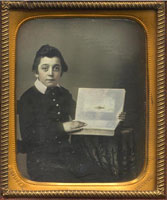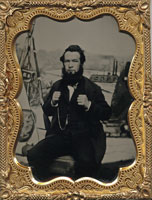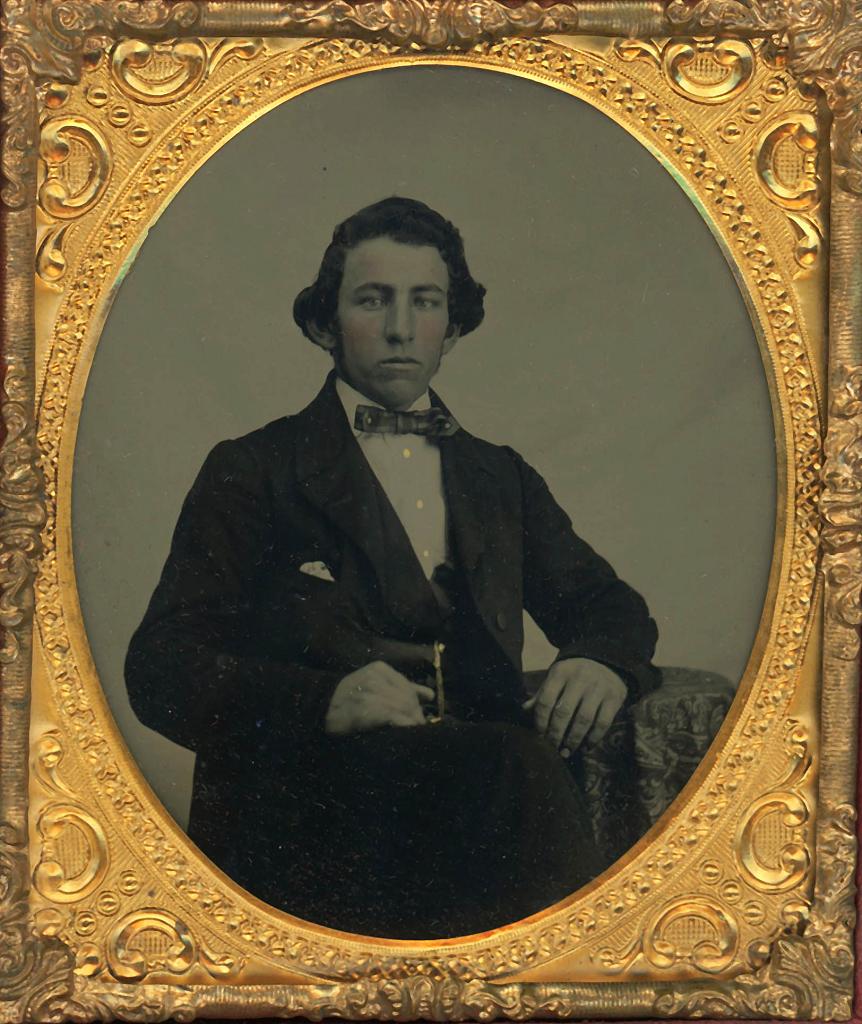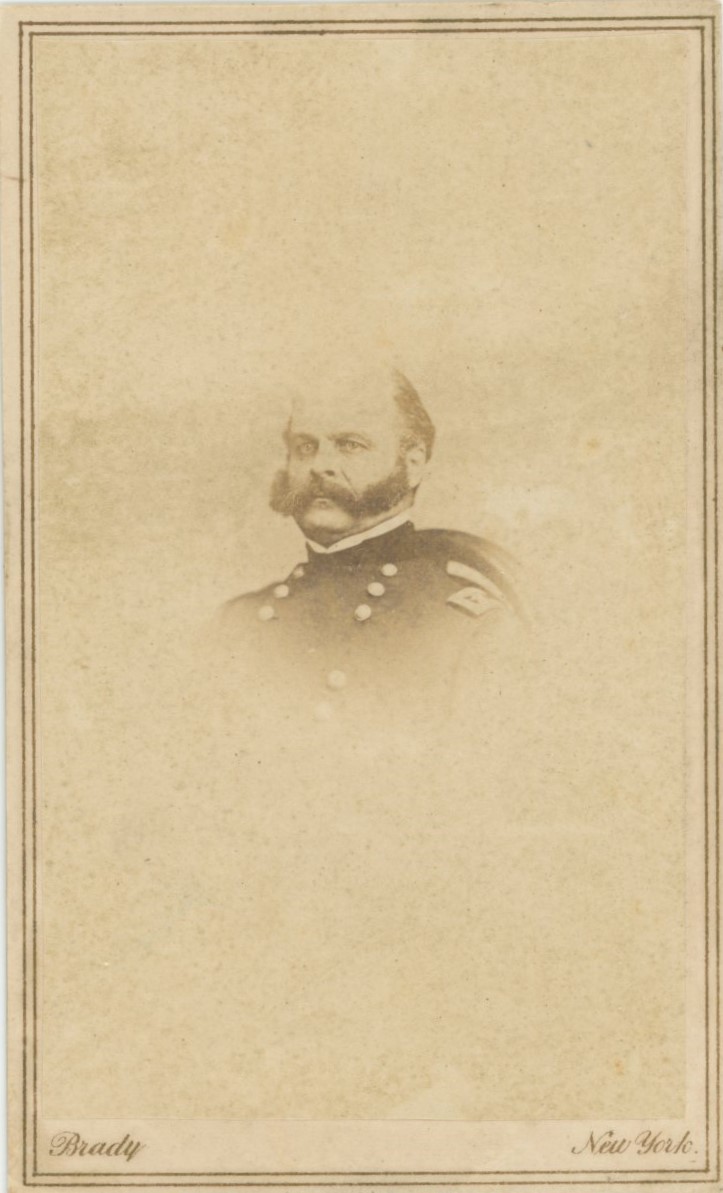A.E. Burnside, Union Major General
Click on an image to enlarge
A.E. Burnside, Union Major General. CDV Back marked Brady's National Portrait Gallery New York
Burnside, Ambrose E., major-general, was born in Liberty,
Ind. May 23, 1824, fourth son of Edgehill and Pamelia (Brown)
Burnside. He was descended from Robert Burnside, a Scotchman who had fled his native country after the final defeat of the"Young Pretender", whose cause he had espoused. During theRevolutionary war the Burnside family took different sides,
and James Burnside grandfather of Ambrose, remained a loyalistduring the struggle. He was forced to flee to the island ofJamaica, but returned in 1786 and died in South Carolina in
His widow, after freeing her slaves, emigrated to Indiana, and her third son, Edgehill, settled in Liberty, a town which was just being built. Here he married and reared a family of nine children. Ambrose the fourth child, was sent to school until he reached the age of seventeen, obtaining a better education than was generally to be had in country schools of the time, and then, his father being too poor to give him professional training, was apprenticed to a tailor. Through conversations with soldiers who had fought in the war of 1812 he became interested in military life, and read all the books which he could obtain which related to military affairs. While engaged in reading one of these books in his shop in Liberty, so goes the tradition, one of the patrons, Caleb B. Smith, then a congressman came into the shop, and asked the boy about his ambitions. He became interested in young Burnside and eventually succeeded in procuring for him an appointment to West Point. Upon his graduation with the class of 1847, Lieut. Burnside was ordered to the City of Mexico, where he remained on garrison duty until the return of the army, when he served at Fort Adams, at Las Vegas, where he was wounded, and at Jefferson Barracks, Mo. In 1853 he resigned his commission as 1st lieutenant of the 3rd artillery to devote his attention to the manufacture of a breech-loading rifle which he had invented. The rifle which had been
submitted in competition with some eighteen others, had
received the approval of a board of commissioners appointed by Congress, and Burnside expected an order from the government. Upon investigating, however, he was told that he would have to pay $5,000 to a professional lobbyist before the government would order any of his guns, and, as he refused indignantly to pay a sum for such a purpose, he was forced to make an assignment, and, with fifteen dollars in his pocket returned west to retrieve his fortunes. Eventually he succeeded, by dint of strictest economy, in paying off all the indebtedness
incurred in the disastrous venture. After his assignment he
secured a position as cashier of the land department of the
Illinois Central railroad, of which his former classmate,
George B. McClellan, was then vice-president, and, a year
later, became treasurer of the road. Just before the outbreak
of the Civil war he made a business trip to New Orleans, and,
learning the state of affairs in the South, arranged his affairs, upon his return to the North so as to be ready to start at a moment's warning for the war. He was appointed in the spring of 1861, by Gov. Sprague of Rhode Island, colonel of the 1st R. I. volunteers, and led his regiment to Washington by way of Annapolis, being one of the first toassist in the defense of the city. In the first battle of Bull Run he commanded a brigade at the beginning of the battle and succeeded to the command of Gen. Hunter's division after that officer was wounded, winning by his services in that engagement many public testimonials and promotion to the rank of brigadier-general. Gen. Burnside won his greatest popularity, however by an expedition which he successfully led against North Carolina in the winter of 1861-62. Starting from Hampton Roads, Jan. 12, 1862, the fleet arrived at Pamlico sound after a tempestuous voyage, on Jan. 25, and on Feb. 8, after several sharp engagements, Roanoke island was captured. This gave control of Pamlico and Albemarle sounds to the northern forces, and soon, by means of a series of brilliant maneuvers, Burnside captured New Berne, Beaufort, and Fort Macon besides a number of less important points of vantage to the north and on his return was hailed as the most uniformly successful of Union generals, being appointed by President Lincoln major-general of volunteers. Gen. Burnside was next attached to the Army of the Potomac, and, with his famous 9th corps, assisted Gen. McClellan in withdrawing from the Peninsula. He next distinguished himself by dislodging the Confederates from a strong position which they held in the passes at South mountain. Lee retreated to Antietam creek, threw up entrenchments there, and waited battle. When the battle was fought, three days later, Burnside's division which held the stone bridge across the creek in spite of fearful loss, was all that saved the Union army from complete defeat. Gen. Burnside assumed command of the Army of the Potomac when
McClellan was retired, in Nov., 1862, and retained it until
superseded, on Jan. 26, 1863, by Gen. Hooker, on account of
the disastrous result of the battle of Fredericksburg, blame
for which was placed on Burnside, and generously assumed by
him. In this battle, which was fought against the advice of
Gen. Burnside, the Union army was forced to attack the
Confederates at a great disadvantage, the latter holding a
line of hills, and being strongly entrenched. Attempts to
carry the place by assault failed, and the army was forced to
withdraw with a loss of 12,OOO men. After being relieved of
his command Burnside resigned, but the president refused to
accept his resignation, and placed him in command of the
Department of the Ohio, where he rendered conspicuous service by ridding the country of guerrillas, enforcing stringent
measures against Southern sympathizers on both sides of the
river, and affording protection to loyalists. In Aug., 1863,
he captured Cumberland gap with a force of 18,000 men, then
moved on to Knoxville and held that place against siege and
assault by Longstreet against terrible odds, until relieved at
the end of a month by Sherman. He was again assigned to
command of his old 9th corps, and in the closing operations of
the war under Grant, in the Wilderness, Cold Harbor and
Petersburg campaigns took a conspicuous part. The losses of
his troops in the explosion of the Petersburg mine were heavy,
and a court martial, called at the suggestion of Gen. Meade,
judged him "answerable for want of success." This decision
was afterwards revoked, however, by a congressional commission which investigated the matter. At the close of the war Gen. Burnside resigned his commission and retired to private life with a reputation as a patriotic, brave and able officer. He was elected governor of Rhode Island in 1866, was twice re=elected, but refused a fourth nomination and engaged again in railroad construction and management. He was in Paris at the time of the Franco-Prussian war, and acted as envoy, and, while his mission of peace was not successful, he gained the respect and admiration of both parties. He was elected to the United States senate from Rhode Island in 1875, and re-elected in 1880. He gained prominence as a senator, proving himself as capable a statesman as he had been a soldier. Gen. Burnside died in Bristol, R. I., Sept. 3, 1881.
Source: The Union Army, vol. 8
Burnside, Ambrose E., major-general, was born in Liberty,
Ind. May 23, 1824, fourth son of Edgehill and Pamelia (Brown)
Burnside. He was descended from Robert Burnside, a Scotchman who had fled his native country after the final defeat of the"Young Pretender", whose cause he had espoused. During theRevolutionary war the Burnside family took different sides,
and James Burnside grandfather of Ambrose, remained a loyalistduring the struggle. He was forced to flee to the island ofJamaica, but returned in 1786 and died in South Carolina in
His widow, after freeing her slaves, emigrated to Indiana, and her third son, Edgehill, settled in Liberty, a town which was just being built. Here he married and reared a family of nine children. Ambrose the fourth child, was sent to school until he reached the age of seventeen, obtaining a better education than was generally to be had in country schools of the time, and then, his father being too poor to give him professional training, was apprenticed to a tailor. Through conversations with soldiers who had fought in the war of 1812 he became interested in military life, and read all the books which he could obtain which related to military affairs. While engaged in reading one of these books in his shop in Liberty, so goes the tradition, one of the patrons, Caleb B. Smith, then a congressman came into the shop, and asked the boy about his ambitions. He became interested in young Burnside and eventually succeeded in procuring for him an appointment to West Point. Upon his graduation with the class of 1847, Lieut. Burnside was ordered to the City of Mexico, where he remained on garrison duty until the return of the army, when he served at Fort Adams, at Las Vegas, where he was wounded, and at Jefferson Barracks, Mo. In 1853 he resigned his commission as 1st lieutenant of the 3rd artillery to devote his attention to the manufacture of a breech-loading rifle which he had invented. The rifle which had been
submitted in competition with some eighteen others, had
received the approval of a board of commissioners appointed by Congress, and Burnside expected an order from the government. Upon investigating, however, he was told that he would have to pay $5,000 to a professional lobbyist before the government would order any of his guns, and, as he refused indignantly to pay a sum for such a purpose, he was forced to make an assignment, and, with fifteen dollars in his pocket returned west to retrieve his fortunes. Eventually he succeeded, by dint of strictest economy, in paying off all the indebtedness
incurred in the disastrous venture. After his assignment he
secured a position as cashier of the land department of the
Illinois Central railroad, of which his former classmate,
George B. McClellan, was then vice-president, and, a year
later, became treasurer of the road. Just before the outbreak
of the Civil war he made a business trip to New Orleans, and,
learning the state of affairs in the South, arranged his affairs, upon his return to the North so as to be ready to start at a moment's warning for the war. He was appointed in the spring of 1861, by Gov. Sprague of Rhode Island, colonel of the 1st R. I. volunteers, and led his regiment to Washington by way of Annapolis, being one of the first toassist in the defense of the city. In the first battle of Bull Run he commanded a brigade at the beginning of the battle and succeeded to the command of Gen. Hunter's division after that officer was wounded, winning by his services in that engagement many public testimonials and promotion to the rank of brigadier-general. Gen. Burnside won his greatest popularity, however by an expedition which he successfully led against North Carolina in the winter of 1861-62. Starting from Hampton Roads, Jan. 12, 1862, the fleet arrived at Pamlico sound after a tempestuous voyage, on Jan. 25, and on Feb. 8, after several sharp engagements, Roanoke island was captured. This gave control of Pamlico and Albemarle sounds to the northern forces, and soon, by means of a series of brilliant maneuvers, Burnside captured New Berne, Beaufort, and Fort Macon besides a number of less important points of vantage to the north and on his return was hailed as the most uniformly successful of Union generals, being appointed by President Lincoln major-general of volunteers. Gen. Burnside was next attached to the Army of the Potomac, and, with his famous 9th corps, assisted Gen. McClellan in withdrawing from the Peninsula. He next distinguished himself by dislodging the Confederates from a strong position which they held in the passes at South mountain. Lee retreated to Antietam creek, threw up entrenchments there, and waited battle. When the battle was fought, three days later, Burnside's division which held the stone bridge across the creek in spite of fearful loss, was all that saved the Union army from complete defeat. Gen. Burnside assumed command of the Army of the Potomac when
McClellan was retired, in Nov., 1862, and retained it until
superseded, on Jan. 26, 1863, by Gen. Hooker, on account of
the disastrous result of the battle of Fredericksburg, blame
for which was placed on Burnside, and generously assumed by
him. In this battle, which was fought against the advice of
Gen. Burnside, the Union army was forced to attack the
Confederates at a great disadvantage, the latter holding a
line of hills, and being strongly entrenched. Attempts to
carry the place by assault failed, and the army was forced to
withdraw with a loss of 12,OOO men. After being relieved of
his command Burnside resigned, but the president refused to
accept his resignation, and placed him in command of the
Department of the Ohio, where he rendered conspicuous service by ridding the country of guerrillas, enforcing stringent
measures against Southern sympathizers on both sides of the
river, and affording protection to loyalists. In Aug., 1863,
he captured Cumberland gap with a force of 18,000 men, then
moved on to Knoxville and held that place against siege and
assault by Longstreet against terrible odds, until relieved at
the end of a month by Sherman. He was again assigned to
command of his old 9th corps, and in the closing operations of
the war under Grant, in the Wilderness, Cold Harbor and
Petersburg campaigns took a conspicuous part. The losses of
his troops in the explosion of the Petersburg mine were heavy,
and a court martial, called at the suggestion of Gen. Meade,
judged him "answerable for want of success." This decision
was afterwards revoked, however, by a congressional commission which investigated the matter. At the close of the war Gen. Burnside resigned his commission and retired to private life with a reputation as a patriotic, brave and able officer. He was elected governor of Rhode Island in 1866, was twice re=elected, but refused a fourth nomination and engaged again in railroad construction and management. He was in Paris at the time of the Franco-Prussian war, and acted as envoy, and, while his mission of peace was not successful, he gained the respect and admiration of both parties. He was elected to the United States senate from Rhode Island in 1875, and re-elected in 1880. He gained prominence as a senator, proving himself as capable a statesman as he had been a soldier. Gen. Burnside died in Bristol, R. I., Sept. 3, 1881.
Source: The Union Army, vol. 8
Shipping Weight:
0.25 lb
Item # 12374
Price Was: 75 $50.00 USD
We are currently not accepting orders on-line. If you would like to purchase this item please email medhurstmd@aol.com or give a call 913-851-8462



